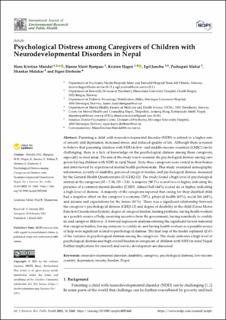| dc.description.abstract | Parenting a child with neurodevelopmental disorder (NDD) is related to a higher rate of anxiety and depression, increased stress, and reduced quality of life. Although there is reason to believe that parenting children with NDD in low- and middle-income countries (LMIC) can be challenging, there is a lack of knowledge on the psychological distress among these caregivers, especially in rural areas. The aim of the study was to examine the psychological distress among caregivers having children with NDD in rural Nepal. Sixty-three caregivers were visited in their homes and interviewed by experienced mental health professionals. This study examined demographic information, severity of disability, perceived caregiver burden, and psychological distress, measured by the General Health Questionnaire-12 (GHQ-12). The study found a high level of psychological distress in the caregivers (M = 5.38, SD = 2.8). A majority (90.5%) scored two or higher, indicating the presence of a common mental disorder (CMD). Almost half (46%) scored six or higher, indicating a high level of distress. A majority of the caregivers reported that caring for their disabled child had a negative effect on the caregiver’s economy (70%), physical health (65%), social life (64%), and dreams and expectations for the future (81%). There was a significant relationship between the caregiver’s psychological distress (GHQ-12) and degree of disability in the child (Gross Motor Function Classification System), degree of caregiver burden, feeding problems, having health workers as a possible source of help, receiving incentive from the government, having somebody to confide in, and caregiver illiteracy. A forward regression analysis entering the significant factors indicated that caregiver burden, having someone to confide in, and having health workers as a possible source of help were significant related to psychological distress. The final step of the model explained 42.4% of the variance in psychological distress among the caregivers. The study indicates a high level of psychological distress and high overall burden in caregivers of children with NDD in rural Nepal. Further implications for research and service development are discussed | en_US |

